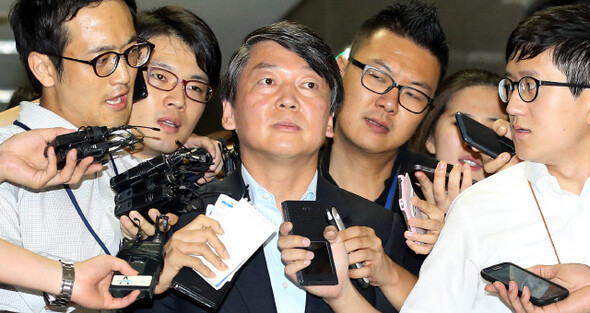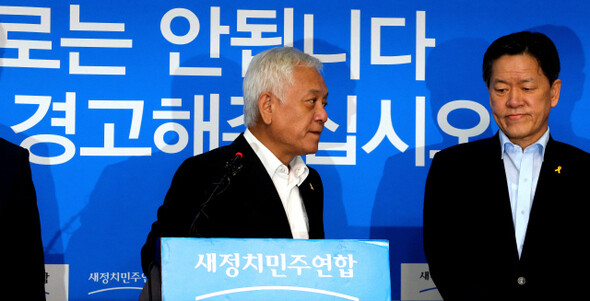hankyoreh
Links to other country sites 다른 나라 사이트 링크
[News analysis] By-elections a disastrous defeat for opposition

By Seong Han-yong, political correspondent and Lee Se-young, staff reporter
The results of the July 30 by-elections weren’t a victory for the ruling Saenuri Party (NFP), but a disastrous loss for the opposition. What explains the defeat? Some are pointing to low summertime voter turnout and the Saenuri’s fixed support base, but this is a wishful attempt to blame it all on contextual factors. Low by-election turnout and a fixed Saenuri support base aren’t variables; they’re constants. That’s why the opposition needs a political strategy.
Another take on the result is that the opposition’s “hold the ruling party responsible for the Sewol ferry disaster” frame lost to Saenuri’s “save the economy” frame. This logical stretch is coming from certain entrenched interests and conservative media. Without the option of using President Park Geun-hye as a marketing tactic, Saenuri simply resorted to “livelihood” and “economy” keywords out of habit. Disgust over the Sewol response is not some frame that the New Politics Alliance for Democracy (NPAD) came up with. Election eve just happened to fall on the 100th day since the disaster, at a time when students at Danwon High School (which most of the victims attended) were testifying in court. Topics like “livelihood” and “the economy” are always important. Anger over the Sewol has yet to cool.
So why did the opposition lose? Experts who follow it closely focused their criticisms on its overall capabilities.

“To come up with a strategy, you need a vision, something that you’re committed to achieving. But the NPAD didn’t show that kind of vision,” said Lee Cheol-hee, director of the Dumun Institute of Political Strategy. “It’s a skill issue. The big names all lost to newcomers. The progressives should have gotten their own new faces out there, but instead it was the opposite. They were all the same. They lost affection from supporters.”
Kim Man-heum, director of the Korea Academy of Politics & Leadership, said the opposition “had no basic concept of how to contest the election.”
“There was no message,” Kim continued. “Their means of going after the Park Geun-hye administration was taken away from them in the nomination process. They had nothing to rally their supporters with. Instead, they just lost steam. Voter turnout in the Gwangsan-B district is a perfect example.”
Insiders saw things slightly differently, directing most of their criticisms at the leadership abilities of NPAD co-leaders Ahn Cheol-soo and Kim Han-gil. Some party insiders had already seen the rout coming before the votes were cast: they predicted a defeat for Sohn Hak-kyu, a shutout in the greater Seoul area, and disasters in Suncheon and Gokseong. Those worries never made their way up to the leadership. According to many lawmakers, Ahn and Kim “don’t communicate with the other lawmakers.”
The various analyses of the election suggested three main reasons for the NPAD’s grim showing.
First was weak leadership. According to this reading, Ahn and Kim bear the blame for the loss. Leadership and followership are two sides of the same coin, and the election advisers’ poor strategy could have been the result of the two chairmen’s lack of leadership or skill in steering the election campaign.
A second factor was the lack of urgency among some lawmakers and party officials, who have undergone some degree of bureaucratization as a stable support system has taken root for lawmakers and parties. A party can’t win an election when it has many lawmakers and officials who are focused on more immediate interests than victory. Skill takes passion. It’s no wonder many have taken to calling the NPAD “the party of small political business owners.”
Third is a lack of vision and goals - or, more accurately, of groups dedicated to them. In the past, former democracy activists committed themselves to party politics and realpolitik in the hopes of changing the country. Without them, Kim Dae-jung and Roh Moo-hyun would never have been won the presidency. Today, it’s tough to find people who have a philosophical reason for winning an election, or for what they need to do to achieve that goal.
When an opposition party can’t compete, it’s politics that loses. The NPAD needs to restore sound leadership and make sweeping internal reforms, or else it has no future. Can floor leader and acting chairperson Park Young-sun untangle the web? For now, we can only wait and see.
[%%IMAGE3%%]The effects of the rout are already being felt hard by the NPAD. On July 31, both Kim and Ahn abruptly resigned over the loss. Their announcement came just four months after the March merger between the Democratic United Party and Ahn’s new party that created the two-leader system. NPAD adviser Sohn Hak-kyu, who lost his by-election bid for the Suwon-C seat (Paldal) in Gyeonggi Province, held a press conference at the National Assembly press center the same day to announce his own retirement from politics. The by-election battering isn’t just costing the leadership their positions - it’s also forcing some of the party’s biggest names to decide whether or not to stay in the game.
For now, Park Young-sun is taking the reins for the now-vacated leadership seat. As early as Aug. 4, the NPAD plans to hold a general lawmakers’ meeting to select an emergency committee to serve as temporary leaders. If convention holds, analysts are predicting, Park will end up chairing that committee as well.
Please direct questions or comments to [english@hani.co.kr]

Editorial・opinion
![[Column] Park Geun-hye déjà vu in Yoon Suk-yeol [Column] Park Geun-hye déjà vu in Yoon Suk-yeol](https://flexible.img.hani.co.kr/flexible/normal/500/300/imgdb/original/2024/0424/651713945113788.jpg) [Column] Park Geun-hye déjà vu in Yoon Suk-yeol
[Column] Park Geun-hye déjà vu in Yoon Suk-yeol![[Editorial] New weight of N. Korea’s nuclear threats makes dialogue all the more urgent [Editorial] New weight of N. Korea’s nuclear threats makes dialogue all the more urgent](https://flexible.img.hani.co.kr/flexible/normal/500/300/imgdb/original/2024/0424/7317139454662664.jpg) [Editorial] New weight of N. Korea’s nuclear threats makes dialogue all the more urgent
[Editorial] New weight of N. Korea’s nuclear threats makes dialogue all the more urgent- [Guest essay] The real reason Korea’s new right wants to dub Rhee a founding father
- [Column] ‘Choson’: Is it time we start referring to N. Korea in its own terms?
- [Editorial] Japan’s rewriting of history with Korea has gone too far
- [Column] The president’s questionable capacity for dialogue
- [Column] Are chaebol firms just pizza pies for families to divvy up as they please?
- [Column] Has Korea, too, crossed the Rubicon on China?
- [Correspondent’s column] In Japan’s alliance with US, echoes of its past alliances with UK
- [Editorial] Does Yoon think the Korean public is wrong?
Most viewed articles
- 1‘We must say no’: Seoul defense chief on Korean, USFK involvement in hypothetical Taiwan crisis
- 2Will NewJeans end up collateral damage in internal feud at K-pop juggernaut Hybe?
- 3[Column] Park Geun-hye déjà vu in Yoon Suk-yeol
- 4Why Korea shouldn’t welcome Japan’s newly beefed up defense cooperation with US
- 5Thursday to mark start of resignations by senior doctors amid standoff with government
- 6N. Korean hackers breached 10 defense contractors in South for months, police say
- 7[Guest essay] The real reason Korea’s new right wants to dub Rhee a founding father
- 8[Column] ‘Choson’: Is it time we start referring to N. Korea in its own terms?
- 9Kim Jong-un expressed ‘satisfaction’ with nuclear counterstrike drill directed at South
- 10[Editorial] New weight of N. Korea’s nuclear threats makes dialogue all the more urgent